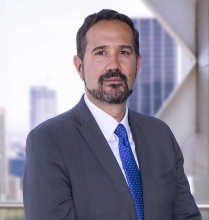International Arbitration Newsletter - April 2020 | Regional Overview: Middle East and Africa
The most relevant updates from Middle East and Africa from the global International Arbitration and ADR practice group at Garrigues.
Turkey
English court prevents an affiliate of Koza Group from funding an arbitration against Turkey
The High Court in London has granted an injunction preventing Koza Ltd, the English subsidiary of the Turkish mining and media conglomerate Koza Group, from using its funds to finance a US$ 6 billion ICSID claim against the Republic of Turkey.
The injunction was requested by the Turkish subsidiary of the group, Koza Altin, in order to prevent businessman Hamdi Akin Ipek from using these funds to finance the arbitration claim he personally intended to initiate against Turkey regarding the alleged expropriation of its parent conglomerate, Turkey’s Koza Group.
The English court based its decision on the doubts raised regarding the authenticity of the share purchase agreement related to the acquisition of control over the Koza group by Ipek Investment. This agreement is the document that would provide the jurisdictional basis for the arbitration in which Ipek Investments and Hamdi Akin Ipek, its owner, claim that the Turkish government illegally seized control of the Koza group.
The Turkish government’s seizure of the group, which was placed under control of Turkish court-appointed trustees in 2015, was made on the basis of the accusation by Turkish authorities that Hamdi Akin Ipek and his family were financing terrorism.
DUBAI
A Samsung subsidiary wins the reinstatement of US$ 23 million ICC award
Samsung Electronics South Africa has won its latest appeal to the Dubai Court of Cassation, which has agreed to reverse the annulment of the US$ 23 million ICC award rendered in favour of Samsung's subsidiary.
The Dubai Court of Cassation has decided to reinstate the award ordering UAE-based Midcom and Onesto Trading to pay US$ 23.2 million to the Johannesburg-based Samsung subsidiary on the understanding that the Dubai Court of Appeal erred in setting aside the award.
The award derives from an arbitration initiated by Samsung in 2017 to seek payment of US$ 23.2 million that Midcom and Onesto Trading will have pending in connection with a sales and supply agreement entered into with the Samsung subsidiary to supply mobile phones, kitchen appliances and marketing services for resale by Midcom and Onesto Trading in Nigeria.
In the arbitration proceedings, the UAE companies, among others, objected to the jurisdiction on the grounds that the arbitration clause in the settlement agreement was invalid. However, the ICC tribunal confirmed its jurisdiction over the claim, ordering UAE-based Midcom and Onesto Trading to jointly and severally pay US$ 23.2 million to Samsung.
The UAE companies filed an application for annulment before the UAE courts, claiming that their respective signatories lacked express authority to conclude the settlement agreement.
In August 2019, the Dubai Court of Appeal decided to set aside the award on the grounds that the arbitration clause was invalid because it had been signed by unauthorized signatories.
That decision was appealed by Samsung to the Dubai Court of Cassation, which finally decided to restore the award on the grounds that the doctrine of good faith prevailed in upholding the arbitration agreement concluded by unauthorized signatories, despite the fact that the new Dubai arbitration law contains an express provision that arbitration agreements must be signed by a representative with specific authority to arbitrate.
IRAQ
ICSID tribunal declines to hear a claim against Iraq under the Organisation of Islamic Cooperation Agreement
An ICSID tribunal has refuse to hear the case initiated by a group of investors in Iraq’s telecoms sector –including Iraq-based Itisaluna and VTEL Middle East and Africa, both subsidiaries of Dubai’s VTEL Holdings, in which Jordanian industrial conglomerate Munir Sukhtian holds a stake– against Iraq.
The claim was brought under the 1981 Organisation of Islamic Cooperation Agreement on promotion, protection and guarantee of investments among Member States (OIC Agreement).
The group of investors claimed that they had invested hundreds of millions of dollars in a license to start their commercial operations in Iraq, transmitting telecommunications traffic, but that the Iraqi government prohibited them from doing so, thus depriving them of the benefit of an essential element of their investment without compensation.
The tribunal’s decision to decline jurisdiction to hear the case derived from the consideration that the claimants could not use the most-favoured nation clause contained in the OIC Agreement to import an ICSID arbitration clause in the 2012 Iraq-Japan Bilateral Investment Treaty because article 25 of the ICSID Convention requires that the parties to the dispute consent in writing to submit to the Centre. Furthermore, the OIC Agreement contains a general consent to arbitration, but it only applies where the parties have first try to settle through conciliation.
Contacts




-
+52 55 1102 3570
-
+57 601 326 69 99



